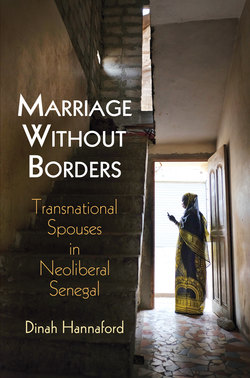Читать книгу Marriage Without Borders - Dinah Hannaford - Страница 8
На сайте Литреса книга снята с продажи.
ОглавлениеPREFACE
[Issa] told her that he would soon depart for Europe, that he absolutely wanted to marry her before he left, because he didn’t want to lose her. The dowry, the gifts, the jewelry and the big ceremony, he would take care of that right away on his first vacation back home. The young lady trembled.… She caught her breath, clung to his arm and bit her lip to control her smile. Issa savored his effect. He hadn’t prepared his speech well, but the word Europe was his best talisman. His fiancée, captivated, accepted with all her heart.… She could already see herself, radiant princess on her eve of coronation, adorned in her beautiful finery, welcoming her love home from Europe and rich with millions. Like her, her parents would accept and facilitate all the steps. They wouldn’t want to deny their dear daughter this marvelous future that was taking shape on the horizon.
—Fatou Diome, Celles qui attendent
In Fatou Diome’s novel, Those Who Wait, young Issa doesn’t need to offer his intended a detailed plan of how he will be successful in Europe. The young woman demands no explanation of how her fiancé will become a legal resident once his fishing boat arrives on the shores of the Canary Islands of Spain. Neither does she ask what kind of work he plans to pursue as a Senegalese high school dropout whose only work experience is in traditional fishing, who speaks not a word of Spanish, and who has no savings to draw on for his initial arrangements upon arrival. Instead, she begins mentally spending the fortunes she is certain he will earn once he makes it to that magical place called Europe.
Diome’s novel, which follows two pairs of mothers and wives of migrants awaiting the return of their overseas sons and husbands, is a fictionalization of what has become a commonplace family arrangement in contemporary Senegal. The book in your hands is an ethnographic account of these long-distance kin relationships in Senegal, which this author calls “transnational marriages”: marriages between Senegalese migrants and non-migrant women in Senegal. As is shown herein, these marriages are a direct response to diminishing confidence in Senegal’s ability to offer its citizens the means to live a fulfilling social life.
That Senegalese imagine better economic prospects abroad is not surprising. Within post-colonial Senegal, economic and social possibilities have steadily declined. Increasing inflation and a lack of remunerative employment make it progressively difficult for Senegalese men and women to find opportunities for financial and social advancement within post-colonial Senegal. Like young people in other parts of Africa facing the same retrenchment of social services and enfeebled economies post-structural adjustment,1 generations of Senegalese struggle to find pathways to successful adulthood in the face of dwindling opportunities.
What makes the Senegalese case compelling and confounding is the attempt to not simply build a future through migration, but to build a future in Senegal through migration out of the country. The popularity of transnational marriages illustrates not a wish to flee Senegal, but a desire and an intention to make life in Senegal a viable option through emigration. The popularity of transnational marriage points to an emergent imperative to secure ties to the world outside of Senegal to realize a social future within Senegal; achieving status and adulthood in Senegal now requires setting a proverbial or literal foot outside of the country.
Despite decades of transnational and return migration from Senegal and Europe, critical knowledge gaps lie in non-migrant understandings of life abroad. My research among Senegalese migrants in France and Italy and wives of migrants in Senegal reveals a fundamental irony about how Senegalese relate to Europe in particular, but to “bitim rëw” (“overseas”; literally “outside the country”) more generally. Though social success in Senegal increasingly depends on access to the world outside of Senegal in some capacity—such as through migration, kinship or marriage to a migrant, and remittances from abroad—most non-migrant Senegalese remain persistently uninformed about the realities of life overseas. Like the characters in Fatou Diome’s novel, many Senegalese migrate and marry migrants on the basis of simplistic and underdeveloped understanding about the relationship between overseas residence and wealth accumulation. That knowledge gap is partly responsible for perpetuating emigration and transnational marriage, as non-migrants cleave to a vague conviction of the immense possibilities that migration can bring.
In many ways, this is a regional story. Parallels of this kind of emigration and transnational kinship can been seen across West Africa.2 Moreover, this Senegalese case illuminates broader global patterns of changes in family structure, particularly for families from across the Global South, and these changes are intimately connected to the structures and regimes of late capitalism. Around the world, global neoliberal labor restructuring combines with local retrenchments of state social services and shrinking civil service sectors to create an imperative of mobility and flexibility. This imperative reaches into the most intimate aspects of life, reshaping expectations and ideals about family and love. Marriage Without Borders is an ethnography of the new kinds of kin practices created at the nexus of global neoliberal capitalism and local conceptions of gender, class, duty, honor, and care.
